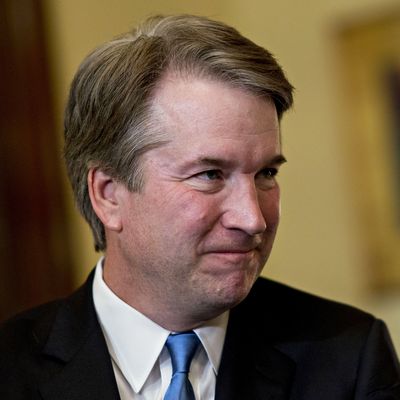
Days before Supreme Court hopeful Brett Kavanaugh faces Senate confirmation hearings, the White House announced that it would withhold more than 100,000 pages of documents from his tenure as a lawyer for the George W. Bush administration in the early 2000s.
In a letter sent to the Senate Judiciary Committee on Friday, Bush lawyer William Burck, who is in charge of compiling documents related to the presidency, wrote that Bush had advised him to err “on the side of transparency and disclosure,” but that the Trump administration directed him not to release certain files, citing executive privilege.
The documents in question, he wrote, “reflect deliberations and candid advice concerning the selection and nomination of judicial candidates, the confidentiality of which is critical to any president’s ability to carry out this core constitutional executive function.”
Senate Democrats said it was the first time the executive branch has invoked the Presidential Records Act to avoid handing over documents to Congress. On Saturday, Senate Minority Leader Chuck Schumer tweeted his outrage:
White House deputy press secretary Raj Shah responded to Schumer by claiming that the administration’s decision amounted to standard procedure.
With his decades of work as a Washington power player — as a Bush lawyer, White House staff secretary, and then an appeals court judge — Kavanaugh has left an extensive paper trail, a history Senate Majority Leader Mitch McConnell worried about before President Trump nominated him. Senate Democrats have been sparring for weeks with Chuck Grassley, the chairman of the Senate Judiciary Committee, over how many documents from Kavanaugh’s past Democrats are allowed access to. On Meet the Press on Sunday, Democratic Senator Amy Klobuchar said that she had seen documents that raise “some very interesting questions” about the nominee, but which she was not allowed to discuss because of restrictions imposed by Republicans.
But so far, Democratic indignation over documents has not really broken through to the public, and neither have any of the more eye-opening revelations about Kavanaugh’s past — like the fact that he once said he admired William O. Rehnquist’s dissent in Roe v. Wade, and suggested that the Supreme Court gave President Nixon an unfair shake back in 1974.
And though the idea of Kavanaugh’s confirmation is not popular with the public, it was always going to be a heavy lift for Democrats to block his nomination, given the cold reality of Senate math. With moderate Republican Senator Susan Collins giving Kavanaugh a warm reception and the death of Senator John McCain meaning that Republicans now have two votes to spare in the confirmation fight, the odds of his candidacy going down in flames seem more remote than ever.






























